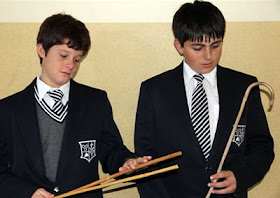One of my more pleasurable pursuits at the beginning of every year is to take various groups of Grade 8's on a history tour around their new school - emphasising the traditions, the values and the Brand of this South African institution which has been operating continuously on Wynberg Hill for 171 years.
 |
I always end up in the Oude Wijnberg Museum
I invariably have to fight back the temptation of enhancing his education...
I was somewhat taken aback when one boy this year matter- of- factly volunteered the information that he knew exactly what a cane was and that it was used 'every day' at his Junior School.
This set me thinking about the role of corporal punishment. I remember the story which Old Boy, Chris Hyland loves to tell. He was selected in his Grade 10 year to take part in the Cape Schools' Cricket Week in Queenstown in 1974. Long after lights out in the hostel in which they were staying, the Wynberg boys were re- living the day's play no doubt with noisy appeals, comments and shots.
In walked an irate duty housemaster with cane in hand. He duly bent over every Wynberg player and gave him a hiding. The Wynberg boys were then quiet with the other teams no doubt taking their cue from the measures which had been handed out to the Wynberg team. Peace was now allowed to reign permitting the housemaster, himself an experienced veteran of many provincial cricket tours, to procure some sleep.
If we as parents and teachers are honest with ourselves, I bet that there are many who are now covertly applauding!
There is no doubt that Power Ruled for all of us now over the age of 35 or so. In retrospect, did it really change behaviour? Generations of Wynberg Old Boys will recall the pride with which they logged the hidings they received on the reverse sides of their school ties. These would be later proudly shown off as a Badge of Honour. Is there any Old Boy reading this who still has such a tie in his cupboard which he can donate to the museum?
The only time now that I really look back with vague nostalgia at corporal punishment is round about Valedictory time when (some) matrics behave as if they are 18 going on 8. Every year sees some unfortunate matrics (which inevitably mean their parents as well) have their invitations to the Final Ceremony withdrawn for repeated thoughtless and crass behaviour. Now those boys have lost out on an important Rite of Passage. Wouldn't a hiding have saved all this heartache?
I remember well the day the news was conveyed to schools that corporal punishment was outlawed. It was just before eight one morning in 1995 when the then Headmaster of Wynberg, Bruce Probyn, arrived at my office door brandishing the fax bearing the announcement. 'I will go with you to tell Ray,' I said with relish, looking forward to seeing his face. Ray Connellan was the Senior Deputy in charge of Discipline.
Ray's door was shut - only to open a few moments later and an unlucky Bubbles Jardine emerge. Knowing Bubbles, I doubt that he had learnt any lesson from that hiding but he certainly learnt the value of 15 seconds! He has now gone into WBHS history as The Last Wynberg Boy To Be Given a Hiding.
Cecilia Lashlie, a New Zealand author, in her outstanding book ‘He’ll be okay: Helping Adolescent Boys become Good Men’ expresses the view that we, as adults, should be applying more consequences rather than punishments. If your son, as an 8-year-old, leaves his lunch on the kitchen table, harden your heart and don't rush off to school with it. Let him go hungry for the day - he will learn more from that. If from an early age, he understands that there are consequences for every decision, then he will learn a valuable lesson which may save his life one day when his mates urge him to put his foot on the accelerator and take on the orange light...
There is no doubt that both in Business and Society, the time of Leadership based on Power is now passed. This is also being reflected in schools where the emphasis is on building relationships. That is what our Wynberg Way is all about - not about punishing but about steering boys in the right direction. We, at school, encourage our boys to realise that every decision carries a consequence. This consequence invariably puts the obligation on adults - teachers and parents - to work together in the important business of developing boys into quality young men.
Cecilia Lashlie talks about a fence which adults must build alongside the adolescent's road through teenagerhood. The prime reason for this fence should be to keep our sons safe as they negotiate the Road of Life.
My experience of teenage boys is that many parents feel that it would be more expedient if they persuaded Eskom to run the national electricity grid through this fence!

Thanks. I thought this was well-written. I especially enjoyed reading about the process of ending corporal punishment and the genuine appreciation you express for the "new way". It's a great step towards civilization.
ReplyDeleteI'd be interested to know if discipline has become more or less of a problem since the abolition.
My first episode and dawning awareness of the arbitrary and unreasoned use of force (and perhaps the start of my anti-authoritarian bias) was being caned for standing behind 3 boys who were being 'boisterous' in line.
ReplyDeleteI had nothing to do with it and walked away with 3 stripes from a man who I had only minutes before, respected. Standard 5. H A Jack Primary. Mr. Arthur Foote.